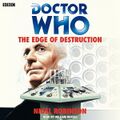The Edge of Destruction (novelisation)
The Edge of Destruction was a novelisation based on the 1964 television serial The Edge of Destruction.
Publisher's summary
In a final bid to regain control of the TARDIS' faulty control system the Doctor is driven to experiment with a dangerous untried combination.
With a violent explosion, the TARDIS blacks out and the crew find themselves trapped inside.
A simple technical fault? Sabotage? Or something even more sinister? Tension mounts as the Doctor and his companions begin to suspect one another.
What has happened to the TARDIS? Slowly a terrifying suspicion dawns. Has the TARDIS become the prisoner of some powerful fifth intelligence which is even now haunting the time-machine's dark and gloomy corridors?
Chapter titles
- Introduction
- Prologue
- Aftershock
- The Seeds of Suspicion
- Inside the Machine
- Trapped
- 'Like a Person Possessed'
- The End of Time
- The Haunting
- Accusations
- The Brink of Disaster
- A Race Against Time
- Epilogue
- Conclusion
Deviations from televised story
- Barbara hallucinates that Ian had too much to drink at the Cricketers.
- The Doctor and Susan have mentioned the TARDIS's laboratory, workshop, conservatory and art gallery during the four travellers' "long weeks" aboard. Aside from the control room, Ian has only seen living, sleeping and recreational areas.
- The sleeping quarters are located a significant distance from the console room in the novelisation.
- The Doctor and Ian investigate the TARDIS's power rooms, which are contained in a complex of fifteen separate rooms containing power stacks capable of powering every aspect of the TARDIS. Ian is sealed in with the internal scanner - a piece of equipment designed to survey the other fourteen rooms - and nearly suffocates to death before he can get the door open.
- Barbara explores the TARDIS laboratory, where she is assaulted by books flying from the bookcase, as well as boxes and various bits of equipment flying from the shelves. The storeroom door in the shadow of the bookcase is lead-lined against its stock of radioactive isotopes. If she'd have entered without a protective suit, as Susan explains, she'd have been dead within thirty seconds.
- The blinding flash is qualified to be not the Big Bang, for not even the TARDIS could survive such an event (as is later seen in Castrovalva), but instead the birth of the Milky Way Galaxy.
- The Doctor's apology to Barbara is significantly expanded. He touches upon the time-traveller's need for one another and their shared wonder in an as yet unexplored Universe. The Doctor asks, explicitly, for her friendship, which she accepts with a shake of his hand.
- The transition into Marco Polo exists, but is more vague than its televised counterpart and lacks the cliffhanger ending (fitting the opening of its novelisation, which lacks the transition from The Edge of Destruction). Enough time has passed between one scene and the next that Barbara has been able to fall asleep. While the Doctor is at the controls, Susan and Ian are having breakfast as the TARDIS materialises.
Writing and publishing notes
- This novelisation was originally offered to Stephen James Walker, but as a two-parter. It was declined and instead written by Nigel Robinson.
- The inside back cover includes colour Fantastic Doctor Who Poster Offers! - but instead of poster ordering details, the page details how to order Star books!
Cover gallery
1988 Hardback edition.
Cover by Alister Pearson
British publication history
- W.H. Allen & Co. Ltd. UK ISBN 0491031386, estimated print run: 1,000, priced £7.95)
Paperback (October 1988)
- Target / W.H. Allen & Co. Ltd. One single paperback edition, estimated print run: 23,000, priced £1.99 (UK).
Audiobook
This Target Book was released as an audiobook on 6 January 2011 complete and unabridged by BBC Audio and read by William Russell.
The cover blurb and thumbnail illustrations were retained in the accompanying booklet with sleevenotes by David J. Howe. Music and sound effects by Simon Power.
External links
to be added


